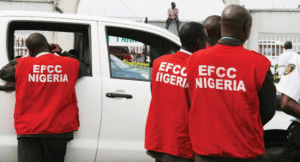I
Ikenna Ngere
Guest

The Lagos State government has clarified its decision not to participate in the legal challenge brought by several states against the Economic and Financial Crimes Commission (EFCC) at the Supreme Court.
The state explained that it already has a pending case with the anti-corruption agency on a similar issue before the court.
Speaking during a two-day Strategic Management meeting with Ministries, Departments, Agencies (MDAs), and other stakeholders, the state’s Attorney-General and Commissioner for Justice, Lawal Pedro, SAN, addressed the media on Wednesday.
He explained that the ongoing legal proceedings between Lagos and the EFCC arose after the Lagos House of Assembly passed a law establishing a state anti-corruption agency.
The EFCC, with the involvement of the Attorney-General of the Federation (AGF), subsequently challenged the state’s law at the Supreme Court.
Pedro highlighted that joining the current suit involving other states would be inappropriate, as it could be viewed as duplicating legal efforts.
He said: “My response to the question as to why Lagos state government is not one of the claimant states that is challenging the EFCC, is that the Lagos state government enacted a law on public complaints and anti-corruption agency to set up the state anti-corruption agency commission to tackle corruption in states.
“However, the EFCC, through the office of the AGF, decided to challenge that law at the Supreme Court. So if we had joined the matter, it would amount to an abuse of the court process.
“It is that suit filed by the AGF that has delayed the operation of the state agency. We hope that the Supreme Court will give us a date very soon and the matter will be resolved.”
Regarding the role of the EFCC and other federal agencies, Pedro explained that while they are authorized to investigate corruption cases, prosecution of state-level offenses remains the responsibility of the Attorney General of the respective state.
He said, “The EFCC, police and other agencies can investigate corruption cases, but when it comes to prosecution, it is the Attorney General of the states that have the power over state offences.
“So any other agency, that is prosecuting state offences, is only doing it on behalf of the Attorney General, because they are deemed to have the fiat of the Attorney General of the state to prosecute state offences.”
Pedro also dismissed suggestions that Lagos’ refusal to join the suit was politically motivated due to President Bola Tinubu’s ties to the state.
“I have been asked if it is because Mr. President is from Lagos, that Lagos is not joining the suit. I say no, it doesn’t have to be so. We already have a pending action for the Supreme Court to decide.
“In the meantime, we have a very cooperative and collaborative effort with EFCC in Lagos, that even state offences that are being prosecuted are being done on behalf of the state government, on behalf of the state Attorney General.
“And the attorney general has the power under the constitution to take over, to discontinue any of such cases in the interest of justice and the public interest,” Pedro clarified.
The post Why We Did Not Join Other States’ Case Against EFCC – Lagos Govt appeared first on Naija News.
